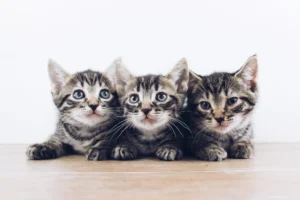Cats and lasers have a curious relationship that many pet owners find endlessly amusing. Watching a feline friend pounce, chase, and try to catch that elusive red dot can provide hours of entertainment. But have you ever wondered why cats are so fascinated by lasers in the first place? In short, cats are natural hunters, and the movement of a laser mimics that of prey, triggering their instinct to chase and catch. This behavior is not only entertaining to watch but also serves as a form of mental and physical stimulation for your furry companion. Understanding why cats are drawn to lasers can help you provide enriching experiences for your pet.
Evolutionary Instincts
Cats have an innate drive to hunt and chase prey, which dates back to their ancestors in the wild. The sight of a moving light triggers their predator instincts, compelling them to pounce and attack. This natural behavior is deeply ingrained in their DNA, making them irresistibly drawn to the elusive red dot of a laser pointer.
Mental Stimulation
Engaging your feline friend in a playful laser chase isn’t just entertaining—it’s also a form of mental exercise. Cats require mental stimulation to prevent boredom and potential behavior issues. Chasing a laser provides an outlet for their energy and keeps their sharp minds actively engaged. It’s a fun and effective way to keep them mentally sharp and content.
In addition to engaging your cat in a laser chase, consider incorporating interactive toys and puzzle feeders into their playtime routine. These activities can further stimulate their cognitive abilities and provide an enriching environment for your furry companion. Remember, a happy cat is a well-stimulated cat!
Physical Exercise
Cats are natural hunters, and playing with a laser can mimic this behavior, providing mental stimulation and physical exercise. This activity can help keep your feline friend active and healthy, preventing obesity and promoting overall well-being. It’s like hitting two birds with one stone – your cat gets a good workout, and you get to witness some hilarious acrobatics as they try to catch that elusive dot of light.
Bonding Experience
Playing with a laser can also be a great bonding experience between you and your cat. By engaging in interactive play sessions, you strengthen your relationship and build trust with your furry companion. It’s a fun way to spend quality time together and create positive associations with each other. So, grab that laser pointer and get ready for some quality bonding time with your feline friend.
Additional Insight: Avoid shining the laser directly into your cat’s eyes as it can cause harm. Be mindful of where you point the laser to ensure a safe and enjoyable playtime for your cat.
Alternatives to Laser Play
If your cat is prone to attacking lasers, consider swapping out the light show for interactive toys like feather wands or crinkly balls. These alternatives still stimulate your cat’s hunting instincts without the potential frustration of never catching the elusive red dot. Additionally, puzzle feeders can engage your feline friend mentally and physically, offering a rewarding challenge that doesn’t involve chasing an unattainable target.
Laser Safety Tips
When using lasers with your cat, always remember to avoid shining the light directly into their eyes. Cats are natural hunters and may become fixated on the laser, leading to potential eye damage. Keep the laser moving to prevent this fixation and limit play sessions to avoid overstimulation. It’s also important to provide real toys or treats at the end of a laser play session to give your cat a sense of accomplishment and a tangible reward for their efforts. Remember, safety first when engaging in laser play with your furry companion.
Additional Insight: While laser pointers can be a fun way to engage with your cat, it’s essential to remember that cats can become frustrated when they are unable to catch their prey. This can lead to stress and anxiety, so it’s crucial to monitor your cat’s behavior during and after laser play to ensure they are still enjoying the experience without negative side effects.
Fun Facts About Cats and Lasers
Cats have an innate hunting instinct that drives them to chase moving objects. When they see a laser pointer’s bright dot, they see it as a potential prey, triggering their predatory behavior. This can lead to hilarious and energetic play sessions as your cat darts around trying to catch the elusive light.
Contrary to popular belief, not all cats are interested in lasers. While many felines find them irresistible, some may not be as captivated by the tiny red dot. Like humans, cats have unique personalities and preferences, so don’t worry if your cat doesn’t engage with a laser pointer. You can try other toys or games to find what best captures their attention and brings out their playful side.
Keep in mind that laser play should be interactive and engaging for your cat. Avoid leaving your pet unsupervised with a laser pointer, as prolonged exposure to the light without a physical reward can lead to frustration or anxiety. Make sure to follow up the laser play with a tangible toy or treat that your cat can successfully “catch,” reinforcing their hunting instincts in a rewarding way.
Why Do Cats Love Chasing Lasers?
Apart from their hunting instincts, cats are drawn to lasers due to the quick movements and unpredictable nature of the light. The sudden appearance and disappearance of the dot mimic the behaviors of small animals, triggering a cat’s predatory drive. This makes laser pointers an exciting and stimulating toy for your feline friend.
To further enrich your cat’s playtime with lasers, you can create obstacles or hiding spots for the light to dart around. This adds an element of challenge and mental stimulation to the game, keeping your cat engaged and entertained. Remember to always end play sessions on a positive note by rewarding your cat with a physical toy or treat to satisfy their natural hunting instincts.
Alex, a passionate animal lover, has experience in training and understanding animal behavior. As a proud pet parent to two dogs and three cats, he founded AnimalReport.net to share insights from animal experts and expand his knowledge of the animal kingdom.




